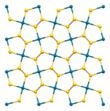Chemistry:Palladium disulfide
|
| |||
| Names | |||
|---|---|---|---|
| Other names
Palladium(II) disulfide
| |||
| Identifiers | |||
3D model (JSmol)
|
|||
| |||
| |||
| Properties | |||
| PdS2 | |||
| Appearance | grey solid[1] or black crystalline powder[2] metallic crystals | ||
| Related compounds | |||
Other anions
|
PdSe2, PdTe2 | ||
Other cations
|
PtS2, RuS2, IrS2 | ||
Related compounds
|
PdS | ||
Except where otherwise noted, data are given for materials in their standard state (at 25 °C [77 °F], 100 kPa). | |||
| Infobox references | |||
Palladium disulfide is a chemical compound of palladium and sulfur with the chemical formula PdS2.[1]
Preparation
Palladium disulfide is formed when palladium(II) sulfide is heated with an excess of sulfur.[1]
- PdS + S → PdS2
However, some starting material may remain even after heating for many months. An alternative route involves heating palladium(II) chloride and excess sulfur to 450 °C in a sealed tube, then washing the crude product with carbon disulfide. This procedure yields PdS2 free of PdS.[2]
Structure
PdS2 contains sulfur-sulfur bonds so it can be thought of as a disulfide that formally consists of S22− and Pd2+ ions.[3] It adopts a layered crystal structure that contains square planar palladium centres and trigonal pyramidal sulfur centres.[2]
Related compounds
A variety of other compounds in the Pd-S system have been reported, including Pd4S, Pd2.8S, Pd2.2S and PdS.[2]
See also
References
- ↑ 1.0 1.1 1.2 Greenwood, Norman N.; Earnshaw, Alan (1997). Chemistry of the Elements (2nd ed.). Butterworth-Heinemann. p. 1152. ISBN 978-0-08-037941-8.
- ↑ 2.0 2.1 2.2 2.3 Grønvold, Fredrik; Røst, Erling (1956). "On the Sulfides, Selenides, and Tellurides of Palladium.". Acta Chemica Scandinavica 10: 1620–1634. doi:10.3891/acta.chem.scand.10-1620.
- ↑ Selb, Elisabeth; Götsch, Thomas; Janka, Oliver; Penner, Simon; Heymann, Gunter (2017). "Crystal Structures of the High‐Pressure Palladium Dichalcogenides Pd0.94(1)S2 and Pd0.88(1)Se2 Comprising Exceptional PdIV Oxidation States". Z. Anorg. Allg. Chem. 643 (21): 1415–1423. doi:10.1002/zaac.201700140.
 |



